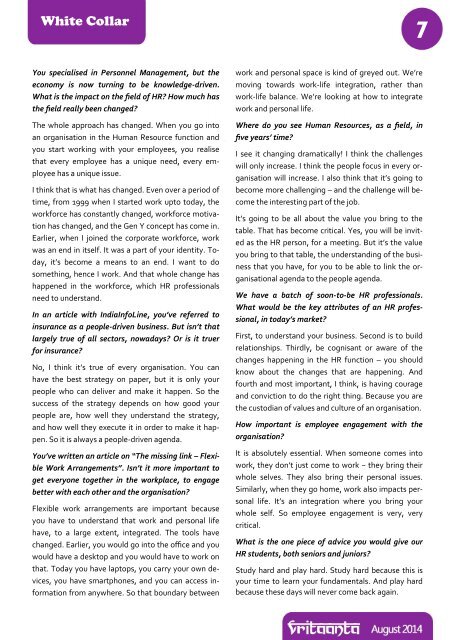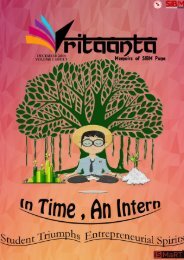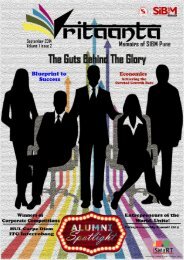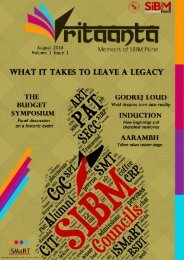Vritaanta August 2014
The monthly magazine of SIBM Pune
The monthly magazine of SIBM Pune
You also want an ePaper? Increase the reach of your titles
YUMPU automatically turns print PDFs into web optimized ePapers that Google loves.
White Collar<br />
7<br />
You specialised in Personnel Management, but the<br />
economy is now turning to be knowledge-driven.<br />
What is the impact on the field of HR? How much has<br />
the field really been changed?<br />
The whole approach has changed. When you go into<br />
an organisation in the Human Resource function and<br />
you start working with your employees, you realise<br />
that every employee has a unique need, every employee<br />
has a unique issue.<br />
I think that is what has changed. Even over a period of<br />
time, from 1999 when I started work upto today, the<br />
workforce has constantly changed, workforce motivation<br />
has changed, and the Gen Y concept has come in.<br />
Earlier, when I joined the corporate workforce, work<br />
was an end in itself. It was a part of your identity. Today,<br />
it’s become a means to an end. I want to do<br />
something, hence I work. And that whole change has<br />
happened in the workforce, which HR professionals<br />
need to understand.<br />
In an article with IndiaInfoLine, you’ve referred to<br />
insurance as a people-driven business. But isn’t that<br />
largely true of all sectors, nowadays? Or is it truer<br />
for insurance?<br />
No, I think it’s true of every organisation. You can<br />
have the best strategy on paper, but it is only your<br />
people who can deliver and make it happen. So the<br />
success of the strategy depends on how good your<br />
people are, how well they understand the strategy,<br />
and how well they execute it in order to make it happen.<br />
So it is always a people-driven agenda.<br />
You’ve written an article on “The missing link – Flexible<br />
Work Arrangements”. Isn’t it more important to<br />
get everyone together in the workplace, to engage<br />
better with each other and the organisation?<br />
Flexible work arrangements are important because<br />
you have to understand that work and personal life<br />
have, to a large extent, integrated. The tools have<br />
changed. Earlier, you would go into the office and you<br />
would have a desktop and you would have to work on<br />
that. Today you have laptops, you carry your own devices,<br />
you have smartphones, and you can access information<br />
from anywhere. So that boundary between<br />
work and personal space is kind of greyed out. We’re<br />
moving towards work-life integration, rather than<br />
work-life balance. We’re looking at how to integrate<br />
work and personal life.<br />
Where do you see Human Resources, as a field, in<br />
five years’ time?<br />
I see it changing dramatically! I think the challenges<br />
will only increase. I think the people focus in every organisation<br />
will increase. I also think that it’s going to<br />
become more challenging – and the challenge will become<br />
the interesting part of the job.<br />
It’s going to be all about the value you bring to the<br />
table. That has become critical. Yes, you will be invited<br />
as the HR person, for a meeting. But it’s the value<br />
you bring to that table, the understanding of the business<br />
that you have, for you to be able to link the organisational<br />
agenda to the people agenda.<br />
We have a batch of soon-to-be HR professionals.<br />
What would be the key attributes of an HR professional,<br />
in today’s market?<br />
First, to understand your business. Second is to build<br />
relationships. Thirdly, be cognisant or aware of the<br />
changes happening in the HR function – you should<br />
know about the changes that are happening. And<br />
fourth and most important, I think, is having courage<br />
and conviction to do the right thing. Because you are<br />
the custodian of values and culture of an organisation.<br />
How important is employee engagement with the<br />
organisation?<br />
It is absolutely essential. When someone comes into<br />
work, they don’t just come to work − they bring their<br />
whole selves. They also bring their personal issues.<br />
Similarly, when they go home, work also impacts personal<br />
life. It’s an integration where you bring your<br />
whole self. So employee engagement is very, very<br />
critical.<br />
What is the one piece of advice you would give our<br />
HR students, both seniors and juniors?<br />
Study hard and play hard. Study hard because this is<br />
your time to learn your fundamentals. And play hard<br />
because these days will never come back again.






